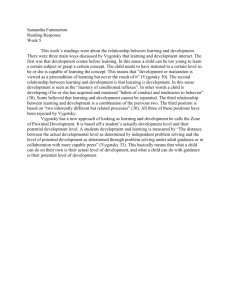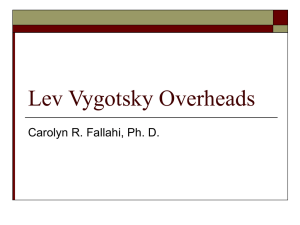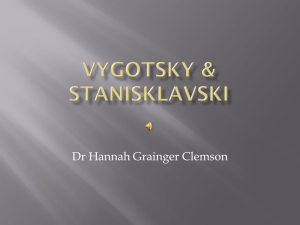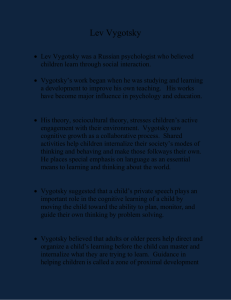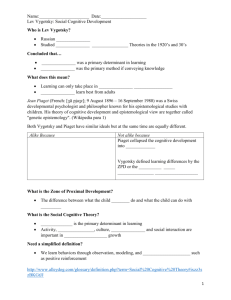O19_1140 Michael Michell
advertisement
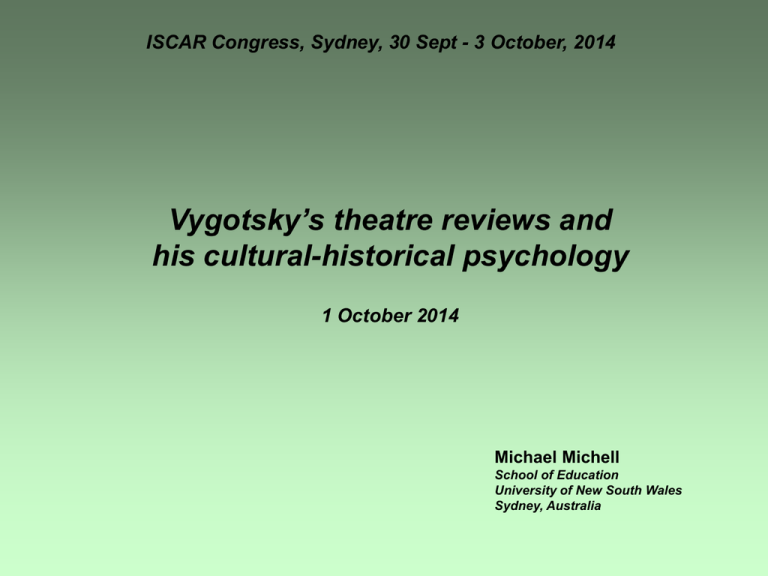
ISCAR Congress, Sydney, 30 Sept - 3 October, 2014 Vygotsky’s theatre reviews and his cultural-historical psychology 1 October 2014 Michael Michell School of Education University of New South Wales Sydney, Australia Overview Background • The research project • Vygotsky textology • The corpus Analysis • Key structure of the reviews • Key themes of the reviews Findings Vygotsky textological studies • Long-standing issues of accuracy and completeness in the translation and publication of Vygotsky’s work (van der Veer & Yasnitsky, 2011) • Dubna Psychological Journal commitment to collect and make available online Vygotsky’s complete works and invite translation, analysis and commentary on these texts from international scholars (Yasnitsky, 2012a). • Publication of: - new, unpublished material from the Vygotsky family archives e.g. early drafts, memos, notebooks - ‘forgotten’ material published during Vygotsky’s lifetime • new insight into the development and trajectory of Vygotsky’s thinking -located the origins of some of his later mature theories in his early texts (van der Veer & Zavershneva, 2011; L. Vygotsky, 2010; Zavershneva, 2010a, 2010b, 2010c, 2012). • “Vygotsky before Vygotsky”; "the Vygotsky we do not know" (Yasnitsky 2011, p.53) The research project Stage one, 2013-2014, Stage 2, 2014-2015 • a scanning and selective sampling of the corpus according to initial criteria (perezhivanie, Stanislavski) • translation from the Russian into English, initial content analysis Initial questions: 1. What themes and preoccupations are evident in Vygotsky’s theatre reviews? How do these relate to the literary and dramarelated psychological concepts of his late works? 2. To what extent are the ideas of the Stanislavsky drama school evident in Vygotsky’s theatre reviews, in particular the role and consciousness of the actor, and the concept of perezhivanie? 3. If there is evidence of appropriation of Stanislavky’s perezhivanie in his theatre reviews, to what extent has Vygotsky changed or transformed the concept for his own purposes? Vygotsky’s theatre reviews Overview of the corpus Nash Ponedel’nik (Our Monday) 1922 • 14 reviews Nash Ponedel’nik (Our Monday) 1923 • 35 reviews Polesskaia Pravda (The Truth of Polesia)1923 • 18 reviews = 67 reviews in total 23 translated Analysis: Typical review structure Meaning potential of the original literary work Genre, setting, plot, mood, characters, themes, Theatrical traditions/styles/genre ‘essence’ of the literary work/play Drama realisations Staging, directors, direction, Acting, actors, style, stereotypes Meta-comments ‘Old theatre’ vs ‘new theatre’ ‘Stereotypes’, ‘patterns and stamps’ Analysis: Vygotsky’s mission • promoting national/provincial theatre • developing a new Russian theatre • educating audiences Analysis: literary- drama translations • ‘meaning potential’/semiotic affordances of the genre • the ‘essence’ of the play • pedagogic purpose Analysis: Spinoza – The Ethics Postulate 6 Each thing, as far as it can by its own power, strives to Persevere in its being. Postulate 7 The striving by which each thing strives to persevere in its being is nothing but the actual essence of the thing. Dem.: From the given essence of each thing some things necessarily follow (by IP36), and things are able [to produce] nothing but what follows necessarily from their determined nature (by IP29). So the power of each thing, or the striving by which it (either alone or with others) does anything, or strives to do anything – that is (by P6), the power or the striving, by which it strives to persevere in its being, is nothing but the given or actual, essence of the thing itself, qed. Of the Origin and Nature of the Affects, Curley (ed.),1994, p.159 Analysis: Spinoza – The Ethics Preface Book II/209 Finally, by perfection in general I shall, as I have said, understand reality, that is, the essence of each thing insofar as it exists and produces an effect, having no regard to its duration. For no singular thing can be called more perfect for having persevered in existing for a longer time. Indeed, the duration of things cannot be determined from their essence, since the essence of things involves no certain and determinate time of Existing. But any thing whatever, whether it is more perfect or less, will always be able to persevere in existing by the same force by which it begins to exist; so they are all equal in this regard. Of the Powers of the Affects, Curley (ed.),1994, p.200 Analysis: old and new theatre • neo-realism, spiritual naturalism • old and new theatre traditions • new theatrical language Analaysis:Tolstoy’s perezhivanie (experiencing) To call up in oneself a feeling once experienced and, having called it up, to convey it by means of movements, lines, colours, sounds, images expressed in words, so that others express the same feeling – in this consists the activity of art. Art is that human activity which consists in one man’s consciously conveying to others, by certain external signs, the feelings he has experienced, and in others being infected by those feelings and also experiencing them. Leo Tolstoy,1995,What is Art? p39-40 Analysis: Stanislavsky’s living theatre The main difference involves the object of attention. The technician is concerned about the public and the audience. He wants to convince them, not the actor who stands speaking with him on stage. For the actor who is in the process [….] of experiencing [the role], the object of attention is himself and what surrounds him on stage. Such an actor convinces the person to whom he is speaking. He does not pay [conscious] attention to the audience, but plays for himself. SS V Part 1 1993, p.444 Experiencing helps the actor to fulfill his basic goal, which is the creation of the life of the human spirit in a role and the communication of that life onstage in an artistic form. As you can see, our prime task is not only to portray the life of a role externally but above all to create the inner life of the character and of the whole play, bringing our own individual feelings to it, endowing it with all the features of our own personality. p19 Analysis: Stanislavsky’s living theatre One should not act an image ... Carry out all your planned actions correctly, penetrate into and sense all the thoughts contained in your role while you are on the stage, analyse your attitude ... and as a result of all that you will achieve an image. Don’t force yourself into any schematic form on the stage. (Stanislavski & Rumyantsev, 2013, p.105) Analysis: Stanislavkian living theatre • perezhivanie and actor/audience psychology • living vs portraying the part • ‘patterns and stamps’ • the Stanislavskian binary Findings: Vygotsky’s Stanislavskian template ‘playing the role’ versus portraying emotions fake, empty theatrical artificiality puppets, marionettes, pulling strings masks, rehearsal before the main performance patterns and stamps, image, stereotypes ‘living on the stage’ living emotions real, spiritual naturalism, neorealism live on the stage living a drama life of a soul Findings: Vygotsky’s theatre reviews • deep knowledge of Russian and nonRussian literature and drama • no traces of Marx or Marxian dialectic • Stanislavskian framework dominant • Spinozan influences • cultural-historical perspective • theatre psychology • nascent psychology of affects
